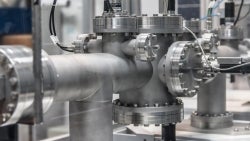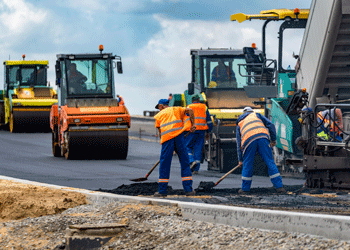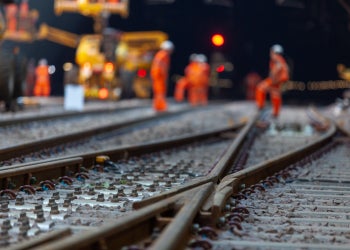AI chip restriction may slow down GCC data centre boom
20 January 2025
 Commentary
Commentary
Jennifer Aguinaldo
Energy & technology editor
A US regulation restricting access to US-made integrated circuits (chips) designed for advanced artificial intelligence (AI) applications could slow down ongoing plans to build substantial data centre capacity in the GCC states.
According to a senior executive with a data centre operator, there are currently no viable alternative suppliers for advanced graphics processing units (GPUs) apart from the US.
“China is roughly two years behind the US in terms of these technologies,” the source told MEED. “There is no doubt China can adapt and improve their technology pace rapidly, but there is still a significant lag.”
GPUs are crucial to building hyperscale data centres catering to advanced AI applications.
Their lack of availability could impede some GCC states’ momentum to build massive data centre facilities over the next few years as part of their national economic diversification and AI strategies.
Chips exports
In December, the US government approved the export of advanced AI chips to a Microsoft-operated facility in the UAE as part of the company’s partnership with UAE-based AI firm G42, according to US-based news website Axios.
The report did not specify the volume of chips approved for export to the UAE.
This followed an announcement in April 2024 that Microsoft had agreed to invest $1.5bn in G42.
At the time, the companies said the investment would bring the latest Microsoft AI technologies and skilling initiatives to the UAE and other countries in the Middle East, Central Asia and Africa, with Brad Smith, vice chair and president of Microsoft, joining the G42 board of directors.
In September last year, the Saudi Data and Artificial Intelligence Authority (SDAIA) and US-headquartered AI microprocessor giant Nvidia confirmed a plan to establish “the largest high-performance data centre infrastructure in the Middle East and North Africa region” in Saudi Arabia.
The project will expand SDAIA’s existing supercomputing infrastructure in Riyadh. The planned expansion is expected to integrate Nvidia’s most advanced technologies, including the upcoming Nvidia Blackwell architecture, and eventually grow to over 5,000 GPUs.
AI as part of US defence strategy
The White House issued a brief on the final draft of the regulation on 13 January, a few days before President Joe Biden’s departure and President-elect Donald Trump’s inauguration.
The regulation is designed to restrict access to powerful GPUs, presumably to prevent third countries from inadvertently passing on or re-exporting these devices to China, given their ongoing power race over AI.
Seen by some experts as essentially including AI in the US defence strategy, the regulation creates three tiers of countries in terms of access to these chips.
The first tier comprises 18 countries that can buy GPU chips without limits. These are Australia, Belgium, Canada, Denmark, Finland, France, Germany, Ireland, Italy, Japan, the Netherlands, New Zealand, Norway, the Republic of Korea, Spain, Sweden, Taiwan and the UK.
The third tier comprises countries of concern, including Macau (China) and Russia, according to some reports.
All other nations and states, including those in the GCC, are presumed to be mid-tier countries, where a cap of approximately 50,000 GPUs between 2025 and 2027 will apply.
Individual companies from these countries will be able to achieve higher computing capability if they comply with US regulations and obtain validated end user (VEU) status.
Data centre construction boom
Some GCC states, including the UAE, Saudi Arabia and Qatar, have a booming data centre market, thanks to their governments’ drive to set up regional AI hubs, increase digital adoption and improve efficiencies in line with their economic diversification agendas.
The Middle East data centre construction market is projected to reach $4.39bn by 2029, growing at a compound annual growth rate of 10.99%.
According to GlobalData, total investment in data centres globally reached $70.6bn in 2024 and is projected to grow by 5% to $74.3bn in 2025.
Photo credit: Pixabay (for illustrative purposes only)
Exclusive from Meed
-
 Dewa raises Empower stake in $1.41bn deal
Dewa raises Empower stake in $1.41bn deal12 February 2026
-
 Saudi cabinet approves Qatar high-speed rail link
Saudi cabinet approves Qatar high-speed rail link12 February 2026
-
 Bidders line up for Saudi sewage treatment contract
Bidders line up for Saudi sewage treatment contract12 February 2026
-
 Indian firm wins Dubai Latifa Bint Hamdan road project
Indian firm wins Dubai Latifa Bint Hamdan road project12 February 2026
-
 SAR tenders Riyadh section of Saudi Landbridge
SAR tenders Riyadh section of Saudi Landbridge12 February 2026
All of this is only 1% of what MEED.com has to offer
Subscribe now and unlock all the 153,671 articles on MEED.com
- All the latest news, data, and market intelligence across MENA at your fingerprints
- First-hand updates and inside information on projects, clients and competitors that matter to you
- 20 years' archive of information, data, and news for you to access at your convenience
- Strategize to succeed and minimise risks with timely analysis of current and future market trends

Related Articles
-
 Dewa raises Empower stake in $1.41bn deal
Dewa raises Empower stake in $1.41bn deal12 February 2026
Dubai Electricity & Water Authority (Dewa) has announced it has increased its stake in Emirates Central Cooling Systems Corporation (Empower) from 56% to 80%.
The transaction was completed through the purchase of 2.4 billion shares and the transfer of the entire ownership of Emirates Power Investment (EPI), which is wholly owned by Dubai Holding.
The total value of the deal is AED5.184bn ($1.41bn).
Empower currently holds over 80% of Dubai’s district cooling market and operates 88 district cooling plants across the emirate.
According to MEED Projects, the UAE’s district cooling sector currently has nine projects worth $1.29bn in the pre-execution phase.
Empower has ownership in four of these projects, which have a combined value of $472m.
This includes a $200 million district cooling plant at Dubai Science Park, with a total capacity of 47,000 refrigeration tonnes serving 80 buildings.
Empower signed a contract to design the plant last August, with construction scheduled to begin by the end of the first quarter of 2026.
The utility is also building a district cooling plant at Dubai Internet City.
UAE-based TMF Euro Foundations was recently appointed as the enabling and piling subcontractor for the project.
https://image.digitalinsightresearch.in/uploads/NewsArticle/15635949/main.jpg -
 Saudi cabinet approves Qatar high-speed rail link
Saudi cabinet approves Qatar high-speed rail link12 February 2026
Saudi Arabia has approved the establishment of a proposed high-speed rail line connecting Riyadh and Doha.
The approval was granted during a cabinet session chaired by King Salman Bin Abdulaziz Al-Saud in Riyadh on 10 February.
The high-speed railway line will cover 785 kilometres (km) and will pass through Hofuf and Dammam, while also linking King Salman International airport and Hamad International airport.
Saudi Arabia and Qatar signed an agreement in December last year to build a high-speed rail line.
The agreement was inked by Saudi Arabia’s Transport & Logistics Services Minister, Saleh Al-Jasser, and Qatar’s Transport Minister, Sheikh Mohammed Bin Abdulla Bin Mohammed Al-Thani.
Trains will reach speeds exceeding 300 kilometres an hour, reducing the travel time between the two capitals to about two hours.
The project is slated for completion in six years. It is expected to serve over 10 million passengers annually and create more than 30,000 direct and indirect jobs.
Riyadh and Doha relaunched the proposed rail link between the two countries in 2022, after agreeing to set a date to begin studying the connection.
In July of that year, France’s Systra was selected to conduct a feasibility study on the proposed scheme, as MEED reported.
A rail link connecting Saudi Arabia and Qatar was planned before the diplomatic dispute that froze relations between Riyadh and Doha from 2017 until the Al-Ula Declaration was signed in January 2021.
In 2016, Qatar Railways Company (Qatar Rail) planned to tender a design-and-build contract for the construction of regional railways in Qatar, including a link to the Saudi border.
https://image.digitalinsightresearch.in/uploads/NewsArticle/15635582/main.jpg -
 Bidders line up for Saudi sewage treatment contract
Bidders line up for Saudi sewage treatment contract12 February 2026

Six bidders are competing in the next phase of Saudi Arabia’s long-term operations and maintenance (LTOM) sewage treatment programme, as National Water Company (NWC) moves closer to awarding a contract.
The contract covers the North Western A Cluster Sewage Treatment Plants Package 11 (LTOM11) and has an estimated value of about $211m.
The project involves the construction and upgrade of two sewage treatment plants with a combined capacity of about 440,000 cubic metres a day (cm/d).
As MEED understands, the companies that have submitted proposals include:
- Alkhorayef Water & Power Technologies (Saudi Arabia)
- Civil Works Company (Saudi Arabia)
- United Water (China)
- Kuzu Group (Turkey)
- VA Tech Wabag (India)
- Aguas de Valencia (Spain)
LTOM11, also known as the North Western A Cluster, forms part of the second phase of NWC’s rehabilitation of sewage treatment plants programme.
The scheme is being procured on an engineering, procurement and construction (EPC) basis with a long-term operations component.
The scope also includes a pumping station, surplus discharge lines, SCADA installation and associated infrastructure.
The main contract was tendered last year, with an award initially expected by the end of 2025.
It is now understood that NWC is preparing to offer the main contract in this quarter.
LTOM programme
LTOM11 follows a series of earlier awards under the programme.
In January, a consortium of United Water (China), Prosus Energy (UAE) and Armada Holding (Saudi Arabia) won the main contract for the Northern Cluster Sewage Treatment Plants Package 10 (LTOM10).
This has an estimated value of about SR203m ($54.1m).
NWC previously awarded $2.7bn-worth of contracts for the first phase of its LTOM programme. This comprises nine packages covering the treatment of 4.6 million cm/d of sewage water for the next 15 years.
As MEED reported, local contracting firm Alkhorayef Water & Power Technologies won three contracts with a combined capacity of 2.04 million cm/d, nearly half of the awarded total. These three contracts are worth more than SR5.53bn ($1.47bn).
A consortium of France’s Suez and the local Al-Awael Modern Contracting Group, with its affiliate Civil Works Company (CWC), won two packages worth a combined SR1.84bn.
A consortium comprising France’s Veolia and Awael-CWC won a single package worth SR1.26bn, and local utility developer Miahona won one package worth SR392m.
In 2024, a joint venture of CWC and Al-Awael Modern Contracting was awarded a $211m contract for LTOM9.
As part of the second phase, the main contract bids for LTOM12 (North Western B Cluster) have also been submitted.
https://image.digitalinsightresearch.in/uploads/NewsArticle/15635292/main.jpg -
 Indian firm wins Dubai Latifa Bint Hamdan road project
Indian firm wins Dubai Latifa Bint Hamdan road project12 February 2026
Indian contractor Larsen & Toubro (L&T) has won a contract to construct the first phase of the Latifa Bint Hamdan Street development project in Dubai.
The contract value is between $110m and $275m, according to L&T’s contract classification.
This project covers 12.2 kilometres of road network from its intersection with Al-Khail Road to Emirates Road.
The project also includes 8.1km of bridges and will add capacity for about 16,000 vehicles an hour in both directions.
The scope also involves widening the two-lane dual carriageway to four lanes in each direction.
The project is scheduled for completion within 36 months.
The contract was awarded by Dubai’s Roads & Transport Authority (RTA).
The project is part of the RTA’s estimated AED16bn ($4.3bn) 2024-27 Main Roads Development Plan, which includes 22 projects across Dubai’s road network, as announced in November 2024.
The development plan includes the construction of new roads and bridges to alleviate traffic congestion at several key locations across Dubai.
Planning for growth
The Dubai 2040 Urban Master Plan was launched in March 2021. Its launch referenced studies indicating that the emirate’s population will reach 5.8 million by 2040, up from 3.3 million in 2020. The daytime population is set to increase from 4.5 million in 2020 to 7.8 million in 2040.
In December 2022, Sheikh Mohammed Bin Rashid Al-Maktoum, Vice President and Prime Minister of the UAE and Ruler of Dubai, approved the 20-Minute City Policy as part of the second phase of the Dubai 2040 Urban Master Plan.
In addition to the road projects, the RTA’s Dubai Metro Blue Line extension also forms part of Dubai’s plans to improve residents’ quality of life by cutting journey times, as outlined in the policy.
The policy aims to ensure that residents can meet 80% of their daily needs within a 20-minute walk or bike ride. This goal will be achieved by developing integrated service centres with the necessary facilities and by increasing population density around mass transit stations.
https://image.digitalinsightresearch.in/uploads/NewsArticle/15635237/main.gif -
 SAR tenders Riyadh section of Saudi Landbridge
SAR tenders Riyadh section of Saudi Landbridge12 February 2026

Saudi Arabia Railways (SAR) has tendered a design-and-build contract for the construction of a new railway line, the Riyadh Rail Link, which will run from north to south Riyadh.
The tender was issued on 29 January, with a bid submission deadline of 29 March.
The scope of work includes constructing a 35-kilometre-long double-track railway line connecting SAR’s North-South Railway to the Eastern Railway network.
The contract also covers the procurement, construction and installation of associated infrastructure such as viaducts, civil works, utility installations, signalling systems and other related works.
The project is expected to form a key component of the Saudi Landbridge railway.
Last month, SAR said it would deliver the Saudi Landbridge project through a “new mechanism” by 2034, after failing to reach an agreement with a Chinese consortium for the construction of the project, as MEED reported.
In an interview with local media, SAR CEO Bashar Bin Khalid Al-Malik said the consortium failed to meet local content requirements and that the project will now be delivered in several phases under a different procurement model.
The project has been under negotiation between Saudi Arabia and China-backed investors keen to develop it through a public-private partnership.
Al-Malik said that the project cost is about SR100bn ($26.6bn).
It comprises more than 1,500 kilometres (km) of new track. The core component is a 900km new railway between Riyadh and Jeddah, which will provide direct freight access to the capital from King Abdullah Port on the Red Sea.
Other key sections include upgrading the existing Riyadh-Dammam line, a bypass around the capital called the Riyadh Link, and a link between King Abdullah Port and Yanbu.
The Saudi Landbridge is one of the kingdom’s most anticipated project programmes. Plans to develop it were first announced in 2004, but put on hold in 2010 before being revived a year later. Key stumbling blocks were rights-of-way issues, route alignment and its high cost.
In April last year, MEED exclusively reported that SAR had issued a tender for the lead design consultancy services contract on the Saudi Landbridge railway network.
MEED understands that the scope covered the concept design and options for the preliminary and issued-for-construction design stages on the network.
MEED reported that the launch of a design tender directly by SAR suggested that Riyadh was looking at other options to develop it alongside the Chinese proposal.
In December 2023, MEED reported that a team of US-based Hill International, Italy’s Italferr and Spain’s Sener had been awarded the contract to provide project management services for the programme.
If it proceeds, the Saudi Landbridge will be one of the largest railway projects ever undertaken in the Middle East and one of the biggest globally. Based on typical design timeframes, tenders for construction are likely to be ready by mid-2026, although the question of how it will be financed will need to be answered before it can proceed to the next step.
https://image.digitalinsightresearch.in/uploads/NewsArticle/15635220/main.jpg



.gif)